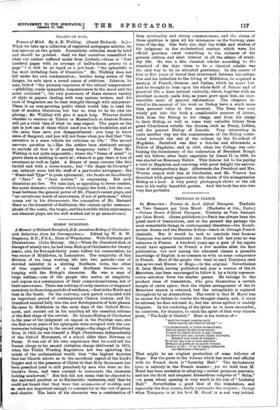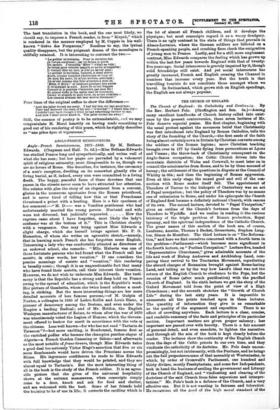TENNYSON IN FRENCH.
In Memoriam : Poimes de Lord Alfred Tennyson. Traduits en Vers franeais par Leon Morel. (Hachette et Cie., Paris.) —Poemes Divers d'Alfred Tennyson. Traduits en Vera francais par Leon Morel. (Same publishers.)—Paris has always been the great mart of translations, and at the present day perhaps the most remarkable things in contemporary literature—the Scandi- navian drama and the Russian fiction—reach us through French channels. But it would be rash to conclude that because Tennyson was never translated into French till last year_ he was unknown in France. A hundred years ago a poet of his repute would have appeared in French a few months after his first publication, but now among the educated classes a passable knowledge of English is as common as with us some competence in French. Most of the people who want to read Tennyson read him as we read Musset or Hugo,—in the original. Nevertheless M. Leon Morel, having published last year a version of the In Memoriam, has been encouraged to follow it by a fairly represen- tative selection from the shorter poems. He belongs to the prudent class of translators, who give themselves a certain margin of extra space; thus the rhyme arrangement of the In Memoriam stanza is retained, but the octosyllable is replaced throughout by an Alexandrine. The result is that M. Morel has no excuse for failure to render the thought clearly, and, it must be allowed, he does not need it ; but the otiose epithet is unduly frequent. In his rendering of the lyrics he is more successful ; he contrives, for instance, to catch the spirit of that very elusive poem, " The Lady of Shalott." Here is his version of— e And the reaper reaping early
Down among the bearded barley ":— " Le molssonneur, a l'aube molssonnant, Debout parml les epls trissonnant, Pe It un chant sonore et gal, venant Du Beuve clair qut, suivant maint tourmint, Descend aux tours de Camelot ; Et le soir las, sous la lune argentde Dressant la gerbe en la plaine .lventde Ecoute, et dit C•est Is dame enchantee La chAtelaine "
That might be an original production of some follower of Hugo. But the poem in the volume which has most real affinity with its French dress is "Locksley Hall." The declamatory lyric is entirely in the French manner ; yet we hold that .M. Morel has been mistaken in adopting a rather pompous quatrain, and not the Said and eloquent Alexandrine couplets of " Rolla," —a poem whose opening is very much in the key of " Locksley Hall." Nevertheless a good deal of the translation, and especially the first stanza, fairly represents the original ; though when Tennyson is at his best M. Morel is a sad way behind. The best translation in the book, and the one most likely, we should say, to impress a French reader, is from " Rizpah," which is rendered in the manner employed by M. Coppee in his well- known " Greve des Forgerons." Needless to say, the lyrical quality disappears, but the poignant drama of the monologue is skilfully retained. It is interesting to contrast the two:-
" Le ge011er m'entraina. Pour la derniere foie Je l'avals enibrasse ; car on fertua Is pone Du cachot. J'entendis `Mere' c'etalt sa volt; Je luttal pour rentrer lusqu'a ce qu'on m'emporte Il vonlalt dire on mot, Je n'al pu savolr quol ; Le ge011er m'entraina, vaincne, & demi morte. AJors, comme toujours fentendais ce long Cr! De mon flis mon, Hs m'ont arretee, enfermee; Ils m'ont comme une toile attachee et mon lit. `Mere, 0 Mere 1' et tonjours pendant une aline* Il m'appelalt Is null. Alors ils m'ont frappe* Comme at le pouvals n'entencire pas mon fist Et quand enfln Je fus, apt* tent de tourment, Calms et stupide et sans force. ils m'ont retAchee- Les oiseaux avaient fall leur oeuvre librement.“
Four lines of the original suffice to show the difference :—
" And the jailer forced me away. I had bid him my last good-bye ; They had fastened the door of his cell= 0 mother 1' I heard him cry— I couldn't get back though I tried, he had something further to say, And now I shall never know it. The jailer forced me away."
Still, the essence of poetry is to be untranslatable, and we may congratulate M. Morel heartily on having made something so good out of his rendering of this poem, which he rightly describes as "une piece apse et vigoureuse."



















































 Previous page
Previous page